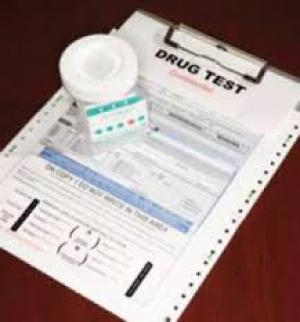It's been a year since Oregon voters approved drug decriminalization. How's it working?
Do you want to know how Mexico's infamous drug cartels came to be. Start here.
How to eke out a loss in war, while losing to the opium poppy, too.
Mississippians will have to wait even longer for their medical marijuana, Coloradans will face some restrictions on medical marijuana purchases, and more.
A Pennsylvania trooper's heroin habit gets him in trouble, a Georgia cop's protection of her drug-dealing boyfriend gets her in trouble, and more.
Massachusetts legislation would legalize health insurance coverage for medical marijuana, federal lawmakers seek language in Justice spending bill to protect legal marijuana states, and more.
A New Jersey judge's ruling keeps an Atlantic City needle exchange program alive (for now), the Scottish government is trying to find a way to open a safe injection site in Glasgow, and more.
Renewed clashes between prison gangs linked to rival drug cartels left at least 68 more dead over the weekend, an Oklahoma marijuana legalization initiative gets hit with a nuisance lawsuit, and more.
A Czech marijuana magazine editor gets convicted of promoting "toxicomania," the DEA has to return money it stole from Americans in two separate cases, New Yorkers rally for sentencing reform, and more.
South Dakota lawmakers are ready to take up marijuana legalization in the next session, the drug czar suggests the pandemic-related easing of methadone restictions could be made permanent, and more.
In a groundbreaking move a year ago now, Oregon voters approved decriminalization for personal use amounts of all illicit drugs, with Measure 110 passing with a healthy 59 percent of the vote. That made the state the first in the US to make this dramatic break with decades of the war on drugs. Now, as other states pondering a similar move look for evidence to bolster their case, some of the initial results in Oregon are looking pretty impressive.

Oregon's Mt. Hood. (David Mark/Pixabay)
Measure 110 promised not only thousands fewer drug arrests, but also a turn from the punitive to the compassionate -- providing hundreds of millions of dollars for greatly expanded access to evidence-informed drug treatment, peer support, housing, and harm reduction services, without raising taxes to do so. Services would be funded through excess marijuana tax revenue (over $45 million) and savings from no longer arresting, incarcerating, and prosecuting people for drug possession. State analysts estimated the excess marijuana tax revenue alone should result in
over $100 million in funding for services in the first year and up to $129 million by 2027.
The state analysts were off the mark. Last week, the Drug Policy Alliance (DPA), whose legislative action arm, Drug Policy Action spearheaded the successful campaign, and the Oregon Health Justice Recovery Alliance, which is working to implement treatment, harm reduction, and support programs, announced they had secured funding of $302 million over the next two years. That's over $150 million a year, including $30 million lawmakers agreed to release ahead of schedule in May of this year.
That initial round of grants went to 70 organizations in 26 of the state's 36 counties, with these results:
- 33 harm reduction and addiction recovery service providers expanded access to treatment services for indigent, uninsured individuals.
- 52 organizations hired peer support specialists -- a role that addiction medicine experts have long heralded as essential to one's recovery journey.
- 32 service providers added recovery, supportive and transitional housing services.
- 30 organizations increased harm reduction services, which include life-saving interventions like overdose prevention; access to naloxone, methadone and buprenorphine; as well as drug education and outreach.
"We were about to have to close our doors in Wasco County, which would have been devastating to the people that depend on us for support there, but thanks to Measure 110 passing, we were not only able to get the funding we needed to stay open, but also to expand the services and spectrum of care we were able to provide our clients," said Monta Knudson, Executive Director of Bridges to Change, a nonprofit that offers peer recovery support, housing and treatment services in the state.
"Addiction has touched us all somehow, some more personally and heartbreakingly than others," said Tera Hurst, Executive Director of the Health Justice Recovery Alliance. "Too many of us have lost loved ones to addiction, or struggled with it ourselves. COVID-19 has made things much worse, decreasing access to care during a time when Oregonians need these services more than ever before. That's why we celebrate the great strides made when it comes to addressing Oregon's addiction crisis, while recognizing that there's still much work to be done. Our immediate focus is to ensure every Oregonian knows these critical harm reduction and recovery services are being invested in and expanded so that they will be available to anyone who wants and needs them, and that they can feel comfortable and safe accessing them."
But while the huge expansion of treatment, harm reduction, and related social services is undeniably a good thing, drug decriminalization is ultimately about getting people out of the criminal justice system by not getting them sucked into it in the first place. It's looking like Measure 110 is achieving that goal.
According to the Oregon Criminal Justice Commission, there were roughly 9,000 drug arrests a year prior to passage of Measure 110, and while it is too early to have precise numbers, thousands of Oregonians who would have been arrested for drug possession this year have instead faced only their choice of a $100 fine or a health assessment. It won't be 9,000 fewer drug arrests, though, because some felony drug possession arrests (possession of more than the specified personal use amounts) have been downgraded to still arrestable misdemeanors. Still, it will be thousands fewer people subjected to the tender mercies of the criminal justice system and all the negative consequences that brings.
"A year ago, Oregonians voted yes on Measure 110 to remove criminal penalties for possession of drugs and expand access to health services. Now, because of this measure, there are thousands of people in Oregon that will never have to experience the devastating life-long barriers of having a drug arrest on their record, which disproportionately and unjustly affected Black and Indigenous people due to targeted policing," said DPA Executive Director Kassandra Frederique. "Because of this measure, there is more than $300 million in funding that did not exist before being funneled into community organizations to provide adequate and culturally competent care that people desperately need. And while the devastation of 50 years of cruel and counterproductive policies can’t be erased overnight, by all metrics we hoped to achieve, and what voters asked for, we are going down the right path."
A number of states -- including Washington, Massachusetts, Vermont, Maine, New York, Rhode Island, Maryland and Kansas -- the District of Columbia, and even the United States Congress have introduced bills or launched campaigns to similarly remove criminal penalties for drug possession and increase access to health services since the passage of Measure 110. These initial results should provide plenty of ammunition for advancing those campaigns.
back to top
The Dope: The Real History of the Mexican Drug Trade by Benjamin T. Smith (2021, W.W. Norton, 462 pp, $30 HB)
This past weekend, top-level American officials were in Mexico City meeting with their Mexican counterparts to discuss rebuilding cooperation in the endless struggle against Mexican drug trafficking organizations. The meeting comes nearly 15 years after then-President George W. Bush and then-Mexican President Felipe Calderon initiated the Merida Initiative to fight drugs, crime, and violence. In 2007, when the Merida Initiative began, there were about 2,300 drug-related deaths in Mexico. Fifteen years and $1.6 billion in US security assistance later, the annual Mexican death toll is north of 30,000, American overdose deaths largely linked to Mexican-supplied fentanyl are at an all-time high, and despite killing or capturing dozens of "kingpins," the so-called "cartels" are more powerful than ever.
In
The Dope: The Real History of the Mexican Drug Trade, Mexico historian Benjamin T. Smith relates the story of another meeting between American and Mexican officials more than 80 years ago. It was at the League of Nations in 1939, and Mexican diplomat Manuel Tello was trying to sell the assembled narcotics experts on a novel approach to opioid addiction: Post-revolutionary Mexico had just passed a new drug law that allowed for state-run morphine dispensaries. Doing that could treat addiction and allow users to get their fix without resorting to a black market, he argued.
That proposal, one much in vogue in harm reduction and public health circles these days, was shot down by none other than Harry Anslinger, head of the American Federal Bureau of Narcotics and self-appointed dope cop to the world. He made it clear to the Mexicans, who had also irked him by challenging his Reefer Madness propaganda, that no such nonsense would be tolerated. That encounter, Smith's narrative makes clear, is emblematic of the US-Mexico relationship when it comes to drugs. The US, with its insatiable appetite for mind-altering substances, has for decades leaned on Mexico to repress the trade its citizens demand, and the results have for decades been dire.
As Smith shows, US pressure on Mexico to ramp up its anti-drug efforts, particularly in the 1940s and 1970s, produced temporary results but also long-term pathologies. Where Mexican authorities had been happy to manage the trade rather than repress it, Washington demanded strict enforcement and aggressive action. Harsher enforcement, including the resort to torture and murder (with the knowledge, encouragement, and sometimes the participation of DEA agents), produced a meaner criminal underworld. Smith especially notes the American insistence on a broad strategy of relying on informants as an aggravating factor in escalating trafficker violence, as traffickers turned on each other for revenge or to protect themselves from potential rats.
Smith also clarifies that the drug trade has always been seen not just as a scourge but as a resource by elements of the Mexican state. Early on, a post-revolutionary governor in Sinaloa taxed the opium traffickers and used the proceeds for public works. Governors in border states like Baja California and Chihuahua followed suit, taxing the trade, protecting favored traffickers and making exemplary busts of those without favored status to please the Americans. Although, as he notes, the politicians increasingly tended to forget the public works and just pocket the money themselves.
Smith described the structure of the relationship between the Mexican state and the drug traffickers as more a "protection racket" than an adversarial one Prior to the 1970s, the racket was carried out at the state level, with the governors and the state police forces providing the protection. Levels of violence were generally low, but likely to spike when a change of administration meant a new set of players in the racket and a new set of favored and disfavored traffickers. The favored traffickers could get rich; the unfavored ones could get jailed or killed as sacrificial lambs to appease the Americans.
In the 1970s, though, both the repression and the protection racket went national, with the mandate to fight the drug trade (and the license to manage it) going to the dreaded federales and their masters in the Ministry of Justice and the presidential palace. The levels of violence increasingly dramatically as the federales and the armed forces pleased the Americans by arresting, torturing, and killing marijuana- and opium-growing peasants as well as traffickers. Traffickers who could once accommodate themselves to the occasional exemplary short prison sentence now fought back when faced with death or years behind bars.
But in this century, thanks largely to fabulous profits from the cocaine trade, the drug traffickers have flipped the script. They no longer work for the cops; the cops now work for them. It's a process Smith refers to as "state capture," even if the state function that is being captured is illicit. Now, cops and politicians who don/t understand who is charge end up in unmarked graves or starring in horrid torture/murder videos.
The Dope is a fascinating and sobering tale, full of colorful characters like Dr. Leopoldo Salazar Viniegra, the crusading post-revolutionary physician who argued that marijuana was harmless and whose government office was behind the morphine dispensary plan, and La Nacha, Ignacia Jasso, the dope queen of Ciudad Juarez for decades, along with a veritable rogue's gallery of traffickers, cops, spooks, and politicians, all of whom vie for control of the trade and its incredible profits.
It also reveals some broad findings. First, economics is the driving force of the drug trade, and the economic opportunity it has provided (and continues to provide) to millions of Mexicans means it is not going away, Second, as noted above, authorities have sought to harness income from the drug trade, with the result that they are now harnessed to it. Third, aggressive anti-drug policies are driven more by moral panics, the need for bureaucratic fundraising, and scapegoating, and "are rarely implemented for their effectiveness." Nor do they work, even on their own terms, as our current overdose death numbers shout out. Fourth, the causes of violence originate "not from inside the drug trade, but inside the state," particularly with the churning of protection rackets with the arrival of new political leadership. "The other principal cause of violence has been the war on drugs itself."
There is an extensive mythology around the Mexican drug trade. Benjamin T. Smith has gone a long way toward dispelling those myths by providing an accurate, in-depth, well-sourced history of the trade and the domestic and international politics around it. To understand today's fearsome Mexican drug cartels, start here.
back to top
Chronicle Book Review: The Afghanistan Papers: The Secret History of the War by Craig Whitlock (2021, Simon & Schuster, 346 pp., $30 HB)
Well, this is a book that could hardly be more timely. Coming out in the immediate wake of the chaotic debacle that was the final American withdrawal from Afghanistan,
The Afghanistan Papers takes advantage of voluminous troves of heretofore unseen accounts of the war to paint an unflattering portrayal of two decades of our seemingly interminable occupation of the country in the name first of fighting Al Qaeda and then of vanquishing the Taliban.
While the book is about the war effort as a whole, for devotees of drug policy, it has two chapters specifically to opium production, its role in the war, and American and allied efforts to suppress it. More on that below.
The author, Craig Whitlock, is an investigative journalist with The Washington Post who spent the last two decades covering the global war on terror and has won prestigious journalistic awards for his efforts. In 2016, he learned of the existence of hundreds of interviews with war participants -- civilian and military alike -- conducted by the Special Inspector General for Afghanistan Reconstruction (SIGAR) under the rubric Lessons Learned.
For reasons that would become obvious upon their release, SIGAR did not want to release them, but the Post sued under the FOIA Act, eventually prevailing and producing a series of stories based on them in 2019. Here, Whitlock supplements those Lessons Learned interviews with oral history interviews of officials who served at the US embassy in Kabul conducted by the Association for Diplomatic Studies and Training, interviews with more than 600 Afghanistan war veterans conducted by the Army's Operational Leadership Experience project, as well as hundreds of previously classified memos Pentagon head Donald Rumsfeld drafted between 2001 and 2006.
Woven together in Whitlock's narrative, the interviews and documents present a devastating indictment of American hubris, cluelessness, and fecklessness as general after commanding general came and went, all proclaiming "progress" even as the war effort slipped deeper and deeper into the Afghan morass and the body count -- both allied and Afghan civilians -- grew ever higher.
"We didn't have the foggiest notion of what we were undertaking," said Army Lt. Gen. Douglas Lute, war czar under Bush and Obama.
"We did not know what we were doing," said Richard Boucher, the Bush administration's top diplomat for South and Central Asia.
"There was no coherent long-term strategy," said British Gen. David Richards, who led US and NATO forces in 2006 and 2007.
Yet officials like these, and many, many more, spent the war years playing up illusory successes, minimizing real defeats, and always proclaiming "progress" was being made. But after about 2005, the only progress really being made was by the Taliban, which had returned from defeat to begin an insurgency that would slowly, year by year, envelop ever more of the country until in August it swept into Kabul and once again took control of the country.
The American project to do nation-building in Afghanistan, always half-baked and half-hearted project failed despite the billions upon billions of dollars poured into the country. Or perhaps because of it. As one interviewee noted, the only thing the US managed to build in Afghanistan was "massive corruption."
Enter the opium economy. Not only were leading members of the American-backed Afghan government stacking up personal fortunes out of the US largesse, they were also deeply implicated in the illicit, but economically dominant, opium economy. Even when the Afghan or Americans developed solid cases of drug trafficking, connections inside the government ensured that traffickers remained protected. The Taliban profited from the trade, but so did everybody else.
And even when the Americans managed to snag one of the traffickers, things tended to go screwy. In 2008, they lured an alleged Afghan trafficker named Haji Juma Khan to Jakarta, where Indonesian authorities extradited him to New York to face trafficking charges brought by a federal grand jury. But when he got to court, his defense attorney mentioned in open court that he was an informant for the CIA and DEA, the judge cut her off and later sealed the legal proceedings. His legal proceedings then vanished into a black hole. He was never convicted of any charges but still spent 10 years in US custody before being released in 2018. That tale ought to raise some Orwellian fears.
Whitlock provides a concise history of our efforts to suppress the opium economy as well as the profound contradiction at the heart of the effort: Any attempt to suppress the opium economy undermined the counterinsurgency project. In other words, you could have your war on terror or you could have your war on drugs, but you couldn't have both.
Not that the US and its allies didn't try. In 2003, the British offered to pay farmers to eradicate their crop in one province, but the farmers just took the money and harvested the crops anyway. In 2006, the Bush administration launched Operation River Dance, siccing tractors and weed whackers on the poppy fields of Helmand province. The tractors broke down, the hand eradicators quit and worked harvesting poppies whey they got better pay, and corrupt local officials ensured that only disfavored farmers got raided. Not only was the operation a flop -- despite the de rigueur press releases announcing "progress" -- it was severely counterproductive to the war effort because it enraged the opium economy-dependent population of the province, already a Taliban hotbed, and turned them decisively against the Americans and their Afghan allies in Kabul.
The Obama administration tried a different tack: Alternative development, along with crackdowns on smuggling and trafficking. That didn't work either; between 2002 and 2017, Afghan acreage devoted to opium production quadrupled, even as the US spent $9 billion to stop it. The Trump administration reverted to Bush-style tactics, although in 2017 instead of going after poor peasants, it unleashed high-tech bombers and fighter aircraft on "heroin laboratories" that turned out to be mostly easily replaceable mud huts. The destruction of those mud huts was yet another sign of "progress" that was soon forgotten.
If the American withdrawal from Afghanistan this fall was a debacle, it has many fathers. Joe Biden just got to clean up the mess left by his predecessors, and as Whitlock makes achingly clear, there is plenty of blame to go around.
back to top
Mississippians will have to wait even longer for their medical marijuana, Coloradans will face some restrictions on medical marijuana purchases, and more.
ColoradoColorado Announces New, Stricter Medical Marijuana Rules. As of January 1, the rules for purchasing medical marijuana will be tightened. Among the changes: daily purchases of marijuana flower will be limited to two ounces and eight grams of concentrates, such as wax or shatter. For patient between ages 18 and 20, the limit will drop to two grams per day. The current purchase limit for concentrates is 40 grams per day. To enforce the daily limits, dispensaries will be required to input patient ID numbers on patients' medical marijuana cards. The rule changes come after the legislature passed a bill largely driven about concerns about young people using high-potency marijuana concentrates.
Massachusetts
Massachusetts Bills Would Legalize Insurance Coverage for Medical Marijuana. Lawmakers in both houses have filed companion bills to legalize health insurance coverage for medical marijuana products and clinical visits. State Sens. Julian Cyr (D-Truro)and Jason Lewis (D-Winchester) filed S. 649 in the Senate, while state Rep. David LeBoeuf(D-Worcester) filed the companion legislation in the House. They said that the uninsured cost of medical marijuana makes it too expensive for some patients. Because marijuana remains a Schedule I drug federally, the state does not currently allow insurers to pay for medical marijuana. The bills got a hearing Tuesday in the Joint Finance Committee with several patients testifying that if medical marijuana were more affordable, they could switch from pharmaceuticals drugs to it.
Mississippi
Mississippi Governor Will Not Call Special Session on Medical Marijuana. Gov. Tate Reeves (R) will not call a special session of the legislature to pass a medical marijuana bill after all. Reeves had earlier signaled he was open to a special session to deal with the issue, but more recently indicated he wanted tighter limits on the quantities of marijuana patients could access and limits on the amount of THC allowed in medical marijuana products. On November 1, he said getting the medical marijuana program "done right is more important than getting it done quick." Mississippi voters approved medical marijuana in the 2020 elections, but the state Supreme Court overturned the initiative results, ruling that the initiative process was outdated and unworkable. Lawmakers then filed medical marijuana legislation and urged Reeves to call a special session to handle it. Now, though, the issue will be postponed until the legislature meets again in January.
back to top
A Pennsylvania trooper's heroin habit gets him in trouble, a Georgia cop's protection of her drug-dealing boyfriend gets her in trouble, and more. Let's get to it:
In Los Angeles,
a Los Angeles County sheriff's jail guard was arrested last Monday for trying to smuggle meth into the Men's Central Jail. The unnamed guard was caught with more than 100 grams of meth inside his vehicle parked in the jail's parking structure. He is charged with one felony count each of transportation of a controlled substance and attempted bringing of an illegal substance into a jail.
In Bridgeport, West Virginia, a Randolph County jail guard was arrested last Tuesday for smuggling drugs into the jail for an inmate. Guard Homer Howell, 39, allegedly took drugs and cell phones to the jail when returning from breaks in exchange for money from an inmate's parent. He allegedly made $8,000 to $10,000 for multiple deliveries. He is charged with delivering a controlled substance to a correctional facility.
In Atlanta, a former South Fulton police officer was arrested last Friday for allegedly tampering with evidence in a drug investigation in which her boyfriend was targeted. Former Officer Aliyah Jackson went down after police stopped her boyfriend and found a gun in the car he was driving. He was charged with possession of a firearm by a felon. But police learned the vehicle was owned by Jackson, and as part of the investigation, Jackson was charging with evidence tampering for allegedly concealing information about the boyfriend.
In Harrisburg, Pennsylvania, a state trooper was arrested last Friday for stealing heroin from a police barracks for his own use. Corporal Brian Rickard went down after being found in possession of heroin he had taken from the evidence room. He allegedly used heroin both at home and on the job. He tried to cover up the thefts by altering records on work computers. He is charged with obstructing the administration of law or other governmental function, forgery, tampering with records or identification, tampering with or fabricating physical evidence, theft by unlawful taking, criminal use of a communication facility, unlawful use of a computer, obtaining possession of controlled substance by misrepresentation or possession with intent to use drug paraphernalia.
back to top
Massachusetts legislation would legalize health insurance coverage for medical marijuana, federal lawmakers seek language in Justice spending bill to protect legal marijuana states, and more.

Mississippi Gov. Tate Reeves (R) will not call a special session to pass medical marijuana. (nga.org)
Bipartisan Group of Lawmakers Request Broad Marijuana Protections for States and Territories in Justice Department Spending Legislation. A bipartisan group of legislators has sent a letter to House leaders asking them include broad protections for states and territories that have legalized marijuana. Reps. Earl Blumenauer (D-OR), Tom McClintock (R-CA), Eleanor Holmes Norton (D-DC) and Barbara Lee (D-CA) signed the letter. They ask the leadership to ensure that language is included that bars the use of Justice Department funds "to prosecute those who are in compliance with their state-legal or tribal-legal adult-use marijuana laws." They are asking that the following specific language be included in the Justice funding bill: "None of the funds made available by this Act to the Department of Justice may be used, with respect to any of the States, the District of Columbia, or U.S. territories to prevent any of them from implementing their own laws that authorize the use, distribution, possession, or cultivation of marijuana."
Three Senate Democrats Call on Biden to Pardon all Nonviolent Federal Marijuana Offenders. Sens. Elizabeth Warren (D-MA), Ed Markey (D-MA), and Jeff Merkley (D-OR) have sent a letter to President Biden calling on him to exercise his authority to issue a blanket pardon to all nonviolent marijuana offenders. "Our country's cannabis policies must be completely overhauled, but you have the power to act now," the trio wrote. Biden has yet to embrace marijuana legalization, but he has come out for decriminalization and during a November 2019 debate said "anyone who has a record should be let out jail, their records expunged."
Medical Marijuana
Massachusetts Bills Would Legalize Insurance Coverage for Medical Marijuana. Lawmakers in both houses have filed companion bills to legalize health insurance coverage for medical marijuana products and clinical visits. State Sens. Julian Cyr (D-Truro) and Jason Lewis (D-Winchester) filed S. 649 in the Senate, while state Rep. David LeBoeuf (D-Worcester) filed the companion legislation in the House. They said that the uninsured cost of medical marijuana makes it too expensive for some patients. Because marijuana remains a Schedule I drug federally, the state does not currently allow insurers to pay for medical marijuana. The bills got a hearing Tuesday in the Joint Finance Committee with several patients testifying that if medical marijuana were more affordable, they could switch from pharmaceuticals drugs to it.
Mississippi Governor Will Not Call Special Session on Medical Marijuana. Gov. Tate Reeves (R) will not call a special session of the legislature to pass a medical marijuana bill after all. Reeves had earlier signaled he was open to a special session to deal with the issue, but more recently indicated he wanted tighter limits on the quantities of marijuana patients could access and limits on the amount of THC allowed in medical marijuana products. On November 1, he said getting the medical marijuana program "done right is more important than getting it done quick." Mississippi voters approved medical marijuana in the 2020 elections, but the state Supreme Court overturned the initiative results, ruling that the initiative process was outdated and unworkable. Lawmakers then filed medical marijuana legislation and urged Reeves to call a special session to handle it. Now, though, the issue will be postponed until the legislature meets again in January.
back to top
A New Jersey judge's ruling keeps an Atlantic City needle exchange program alive (for now), the Scottish government is trying to find a way to open a safe injection site in Glasgow, and more.
Medical Marijuana

Colorado tightens its medical marijuana rules, mainly around concerns about youth, dabs, and wax. (Creative Commons)
. As of January 1, the rules for purchasing medical marijuana will be tightened. Among the changes: daily purchases of marijuana flower will be limited to two ounces and eight grams of concentrates, such as wax or shatter. For patient between ages 18 and 20, the limit will drop to two grams per day. The current purchase limit for concentrates is 40 grams per day. To enforce the daily limits, dispensaries will be required to input patient ID numbers on patients' medical marijuana cards. The rule changes come after the legislature passed a bill largely driven about concerns about young people using high-potency marijuana concentrates.
Harm Reduction
New Jersey Judge Rules to Keep Atlantic City Needle Exchange Open -- At Least for Now. Judge Michael Blee of the Atlantic County Superior Court on Friday continued the restraints against Atlantic City enforcement of Ordinance 32 (which would terminate the city's syringe access services operated by South Jersey AIDS Alliance) until further order of the court. Judge Blee also ordered Atlantic City to provide the New Jersey Commissioner of Health with formal written notice of the adoption of Ordinance 32, together with pertinent documents from the litigation. He intends to issue a written opinion on the duration of the restraints no later than December 3.
"Syringe access is health care, period. Every day that the clients of South Jersey AIDS Alliance have access to lifesaving health care service is a day worth celebrating, and we're thrilled that our syringe services will continue operation for the time-being," said Carol Harney, Chief Executive Officer of South Jersey AIDS Alliance. "Our job is to show up for people living with HIV and living with a substance use disorder with the best public health tools we have, and there is no denying that syringe access is an essential service for Atlantic City residents."
International
Germany's Next Coalition Nears Deal on Legalizing Marijuana. The parties likely to form the next governing coalition -- the Social Democrats, the Greens, and the Free Democrats -- are close to a deal on legalizing marijuana. The parties are hammering out details, including rules for the use and sale of marijuana. But it's not a done deal yet, and the outcome could still change. Spokespeople for the three parties declined to comment on the negotiations. The effort comes as public support for marijuana legalization has hit 49 percent with 46 percent opposed -- the first time those in favor polled higher than those opposed.
Scottish Government Working on New Plan for Safe Injection Site in Glasgow. The Scottish government is "actively exploring" ways to open a safe injection site in Glasgow, Deputy Prime Minister John Swinney said Thursday. There are legal and political barriers to overcome. The comment comes after the current Lord Advocate said last week that even though a previous Lord Advocate had ruled in 2017 that such facilities violated the Misuse of Drugs Act, the issue "could be looked at again." But the notion still faces opposition from British Prime Minister Boris Johnson, and it is the British government that determines drug policy for the union. Some 1,339 people died of drug overdoses last year in Scotland, the seventh year in a row of rising overdose deaths.
back to top
Renewed clashes between prison gangs linked to rival drug cartels left at least 68 more dead over the weekend, an Oklahoma marijuana legalization initiative gets hit with a nuisance lawsuit, and more.

The Pennsylvania ACLU says a proposed parental drug screening bill is unconstitutional. (Creative Commons)
Indiana Democratic Party Calls for Marijuana Legalization. The Indiana Democratic Party, has announced its full support for marijuana legalization and called on the General Assembly to get the job done. They also called on Gov. Eric Holcomb (R) to rescind his opposition to legalization. Bills to legalize marijuana have so far gone nowhere in the GOP-dominated legislature, but the Democrats said legalization "would provide the opportunity to create an additional revenue stream for the state, create good-paying jobs, develop a long-term cash crop for Indiana's ag and business communities, provide medicinal opportunities for people like the state's veterans and seniors, and could start the process of expunging records for simple possession across the state."
Oklahoma Marijuana Legalization Initiative Hit with Legal Challenge. A marijuana legalization initiative sponsored by Oklahomans for Responsible Cannabis Action is being challenged in court by an incarcerated person, Paul Tay. Tay's lawsuit raises numerous claims about the constitutionality of the initiative, including challenging the validity of signatures gathered in Indian County. "We believe that we have a really strong case," ORCA Director Jed Green said. "[The man filing this challenge] wants attention… this is the second time that he's done this." Green called the lawsuit "a shotgun challenge," going after multiple points and seeing if any of them stick. Green says the challenge is what he calls a shotgun challenge, going after multiple points and seeing if any of them stick. "We don't believe that a lot of it is really pertinent," he said. There will be a hearing on the challenge on December 14.
Drug Testing
Pennsylvania ACLU Opposes Bill to Compel Parental Drug Screening in Abuse and Neglect Cases. The ACLU of Pennsylvania has come out against HB 1737, which would allow county children and youth services (CYS) agencies to obtain court orders to compel parents to undergo drug and alcohol testing during child welfare investigations if there is evidence that impairment due to drug or alcohol use is a contributing cause of alleged abuse or neglect. "Because drug testing is considered a search, both the Pennsylvania and United States Constitutions require the government to show that it has probable cause before it can compel an individual to undergo a drug test," the group said. "HB 1737 would permit unconstitutional intrusions on parents' privacy rights because it does not contain a requirement that a CYS agency have probable cause to believe that an act of child abuse or neglect has occurred and that drug testing the parent will reveal evidence relating to such abuse." The bill passed the House last week.
International
Ecuador Prison Clash Leaves at Least 68 Dead. In the latest outbreak of fighting among prison gangs linked to international drug trafficking groups, at least 68 prisoners were killed in an hours-long gun battle Saturday inside the Litoral Penitentiary, the country's largest prison. This is the second major outbreak of violence at Litoral in less than two months. In September, 119 prisoners were killed in gang-related clashes there. Another 79 prisoners were killed in clashes last February. So far this year, more than 300 prisoners have died in the violence. The prison violence comes amid a national state of emergency decreed by President Guillermo Lasso in October that empowers security forces to fight drug trafficking and other crimes. The country's prisons hold some 40,000 inmates, including 15,000 jailed awaiting trial, and are filled way above capacity.
back to top
A Czech marijuana magazine editor gets convicted of promoting "toxicomania," the DEA has to return money it stole from Americans in two separate cases, New Yorkers rally for sentencing reform, and more.

Another bumper crop of Afghan opium this year. (UNODC)
GOP House Member Files Federal Marijuana Legalization Bill. Rep. Nancy Mace (R-SC) introduced the States Reform Act, which would legalize marijuana at the federal level. It would do so by removing marijuana from Schedule I of the Controlled Substances Act, leaving it up to the states to set their own marijuana policies. The bill would also set a 3 percent federal excise tax and release and expunge the records of those convicted of federal marijuana offenses. Mace said her bill represented a compromise that could gain support from both Republicans and Democrats.
Wisconsin Bipartisan Bill Would Lighten (Most) Marijuana Penalties. Rep. Sylvia Ortiz-Velez (D-Milwaukee) and Rep. Shae Sortwell (R-Two Rivers) have filed a bill that would lessen penalties for marijuana possession in most of the state, but increase fines in some of the state's largest cities, including Madison and Milwaukee, where the fine for pot possession is $1 in the former and $0 in the latter. Under current state law, pot possession is punishable by up to a $1,000 fine and six months in jail. Under the new bill, the maximum penalty would be a $100 fine with no possibility of jail time. Marijuana reforms have so far gone nowhere in the Republican dominated legislature, which has refused to pass even medical marijuana.
Asset Forfeiture
DEA Forced to Return $100,000 Stolen from Two Victims. Twice in the past week, the DEA has been forced to return money it seized from travelers as they tried to board flights at domestic airports. Although it is not illegal to carry large sums of cash, in both cases, the DEA decided the cash had to have been illegally obtained and seized it. In one case, New Orleans resident Kermit Warren had $30,000 he was carrying to buy a tow truck seized by agents in Cincinnati. Only afte Warren's lawyers presented corroborating evidence to prosecutors back down, agree to return his seized money, and dismiss the case "with prejudice," being they cannot go after the money later. In the second case, with the same elements -- a US airport, a domestic flight, the presence of cash, and unsubstantiated claims about drug trafficking -- the DEA seized $69,000 from New York filmmaker Kedding Etienne. But Etienne, too, fought back and prevailed, but only after rejecting an offer to drop the case after the DEA skimmed 10% off the top.
Harm Reduction
US Overdose Deaths Topped 100,000 in One Year, CDC Says. An estimated 100,300 Americans died of drug overdoses in the period from May 2020 to April 2021, the highest one-year death toll ever, according to provisional estimates from the Centers for Disease Control and Prevention (CDC). That's a jump of 30 percent over the previous year. Experts point to the prevalence of fentanyl in the unregulated drug supply and the social isolation of the coronavirus pandemic as major drivers of the increasing toll. "This is unacceptable and it requites an unprecedented response," said Dr. Rahul Gupta, director of National Drug Control Policy (ONDCP -- the drug czar's office). Fentanyl was implicated in nearly two-thirds of overdose deaths, other opioids in about 12 percent, and non-opioid drugs were implicated in about a quarter of the deaths.
Sentencing
New York Activists Rally for Sentencing Reforms. Activists rallied all across the state on Wednesday to demand sentencing reforms under the rubric Communities Not Cages. Arguing that current laws are unfair and disproportionately target communities of color. The campaign is also calling for the passage of a trio of reform bills, the Eliminate Mandatory Minimums Act, the Second Look Act, and the Earned Time Act. The first would eliminate mandatory minimums and the state's three-strikes law, the second would allow imprisoned people to seek resentencing after serving either half of their sentence or 10 years, and the third would increase "good time" laws to allow prisoners to earn more time off their sentences.
International
Afghanistan's Opium Production Continues to Rise, UN Report Says. Even as the country's Western-backed government was crumbling in the face of a Taliban advance this past summer, Afghan opium production was on the increase, the UN Office on Drugs and Crime (UNODC) reported Wednesday. The 2021 harvest was some 6,800 tons of opium, up 8 percent over 2020. That generated between $1.8 and $2.7 billion for the Afghan economy, but "much larger sums are accrued along illicit drug supply chains outside Afghanistan," it added. The Taliban has threatened to ban the crop, but faces the reality that opium -- which accounts for 10 percent of the national economy -- is a mainstay for thousands of families. "There is no work, all the families are in debt, and everyone's hope is opium," farmer Mohammad Wali explained.
Czech Marijuana Magazine Editor Convicting of Promoting "Toxicomania." Robert Veverka, the editor of the magazine Legalizace, and the magazine itself have been convicted in a district court in the town of Bruntal of inciting and promoting "toxicomania." Veverka was sentenced to 2 ½ years of probation, with a one-year jail sentence hanging over his head. Judge Marek Stach conceded that the magazine provided comprehensive information and expert opinion, as well as insight into medical marijuana, but ruled that some articles could "incite" readers to acquire the means to grow marijuana themselves.
back to top
South Dakota lawmakers are ready to take up marijuana legalization in the next session, the drug czar suggests the pandemic-related easing of methadone restictions could be made permanent, and more.

Drug czar Dr. Rahul Gupta is pushing harm reduction and is considering loosening methadone restrictions. (March of Dimes)
Democratic Divisions Threaten Progress on Federal Marijuana Reforms. Democrats on Capitol Hill are finding it difficult to push forward with marijuana law reforms as they split on whether to pass a bipartisan bill to provide state-legal marijuana firms access to banking services or instead push a full-fledged marijuana legalization bill. Backers of the banking bill have tried to move it by attaching it to a must-pass defense spending bill, but Senate Majority Leader Chuck Schumer (D-NY) is proving a roadblock. He is instead siding with Sens. Cory Booker (D-NJ) and Ron Wyden (D-OR) as a cosponsor a marijuana legalization bill, the Cannabis Administration and Opportunity Act.
The Senate trio and their supporters argue that passing the banking bill first would make passing their broader bill more difficult. "To me, it wouldn't be a win," Booker said Tuesday. "It would be a setback for expunging the records of all of the people who are waiting for some kind of justice. And unfortunately, if you do that, the pressure won't be there to get it done." Those prioritizing the banking bill "are doing a big disservice to our ability to get restorative justice principles passed, and it's really unfortunate they can't see the urgency for the millions of Americans who are carrying criminal charges for nonviolent drug offenses involving marijuana and have had their lives destroyed because of a war on marijuana that has disproportionately impacted people of color." But supporters of the banking bill, the SAFE Banking Act, say it has bipartisan support that legalization lacks and the time has come for Congress to chipping away at pot prohibition.
South Dakota Top Lawmakers Officially Recommend Marijuana Legalization Bill for 2022 Session. The legislature's Executive Board, led by the House speaker and the Senate president pro tempore, has unanimously approved a report from the Marijuana Interim Study Committee recommending that the legislature take up a bill to legalize marijuana during the 2022 session. Meanwhile, activists who ushered a marijuana legalization initiative to victory last year only to see it blocked in court (the state Supreme Court has yet to decide the case) are pushing to put another legalization initiative on the ballot next year, too. As drafted, the current version of the legislation approved in committee and by the executive board would allow adults 21 and older to purchase and possess up to an ounce of cannabis. The state Department of Revenue would be responsible for regulating the market and issuing marijuana business licenses. It does not include the right to grow your own.
Harm Reduction
Biden Administration Releases Model Naloxone Legislation. The administration on Wednesday released model legislation to help states improve access to naloxone treatment for opioid overdoses. The move comes as the nation recorded a record-high 100,000 drug overdose deaths in a one-year period ending in May. The model bill encourages people to obtain naloxone, protects them from prosecution when administering it, requires health insurance to cover it, and provides increased access to it in schools and correctional facilities. "This model law can help all states implement consistent, evidence-based policies to make naloxone always accessible to those who need it," said Office of National Drug Control Policy (ONDCP -- the drug czar's office) head Dr. Rahul Gupta. "We certainly hope that state leaders will carefully consider this model law, which can help save lives."
Drug Czar Wants to Expand Use of Addiction Medication. Dr. Rahul Gupta, head of the Office of National Drug Control Policy (ONDCP -- the drug czar's office) said Wednesday that the Biden administration is now considering making permanent the easing of restrictions on methadone that has occurred during the coronavirus pandemic. Patients must go to a clinic to have methadone administered but were allowed to take a supply home with them during the pandemic, and Gupta suggested that change could be here to stay. "Adoption of these services did increase access to opioid and substance use disorder treatment," Gupta said, so making the changes permanent is "under consideration and we remain pretty hopeful about it."
back to top









